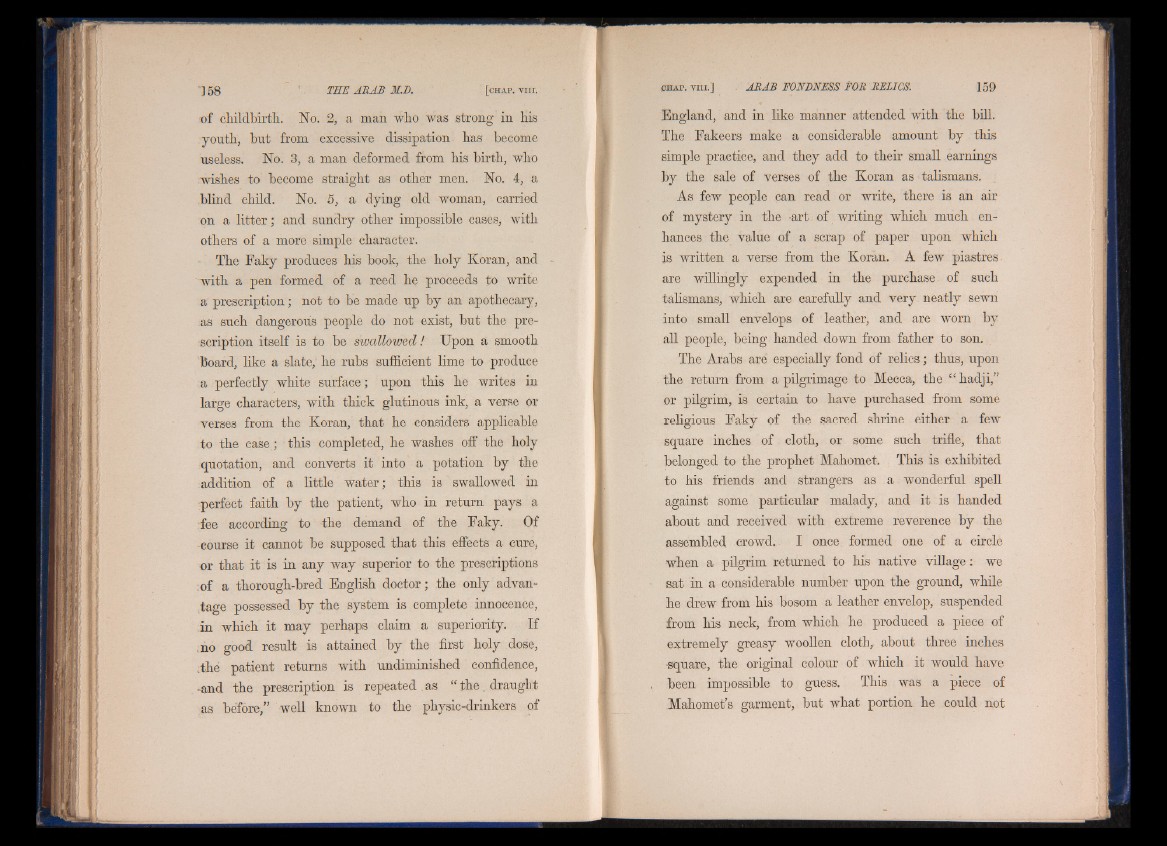
of childbirth. No. 2, a man who was strong in His
youth, hut from excessive dissipation has become
useless. No. 3, a man deformed from his birth, who
wishes to become straight as other men. No. 4, a
blind child. No. 5, a dying old woman, carried
on a litter; and sundry other impossible cases, with
others of a more simple character.
The Faky produces his book, the holy Koran, and
with a pen formed of a reed he proceeds to write
a prescription; not to be made up by an apothecary,
as such dangerous people do not exist, but the prescription
itself is to be swallowed! Upon a smooth
board, like a slate; he rubs sufficient lime to produce
a perfectly white surface; upon this he writes in
large characters, with thick glutinous ink, a verse or
verses from the Koran, that he considers applicable
to the case.; this completed, he washes off the holy
quotation, and converts it into a potation by the
addition of a little water; this is swallowed in
perfect faith by the patient, who in return pays a
fee according to the demand of the Faky. Of
-course it cannot be supposed that this effects a cure,
or that it is in any way superior to the prescriptions
;of a thorough-bred English doctor; the only advantage
possessed by the system is complete innocence,
in which it may perhaps claim a superiority. If
.no good result is attained by the first holy dose,
.the patient returns with undiminished confidence,
-and the prescription is repeated . as “ the. draught
as before,” well known to the physic-drinkers of
England, and in like manner attended with the bill.
The Fakeers make a considerable amount by this
simple practice, and they add to their small earnings
by the sale of verses of the Koran as talismans.
As few people can read or write, there is an air
of mystery in the -art of writing which much enhances
the value of a scrap of paper upon which
js written a verse from the Koran. A few piastres,
are willingly expended in the purchase of such
talismans, which are carefully and very neatly sewn
into small envelops of leather, and are worn by
all people, being handed down from father to son.
The Arabs are especially fond of relics; thus, upon
the return from a pilgrimage to Mecca, the “ hadji,”
or pilgrim, is certain to have purchased from some
religious Faky of the sacred shrine either a few
square inches of cloth, or some such trifle, that
belonged to the prophet Mahomet. This is exhibited
to his friends and strangers as a wonderful spell
against some particular malady, and it is handed
about and received with extreme reverence by the
assembled crowd. I once, formed one of a circle
when a pilgrim returned to his native village: we
sat in a considerable number upon the ground, while
he drew from his bosom a leather envelop, suspended
from his neck, from which he produced a piece of
extremely greasy woollen cloth, about three inches
square, the original colour of which it would have
been impossible to guess. This was a piece of
Mahomet’s garment, but what portion he could not